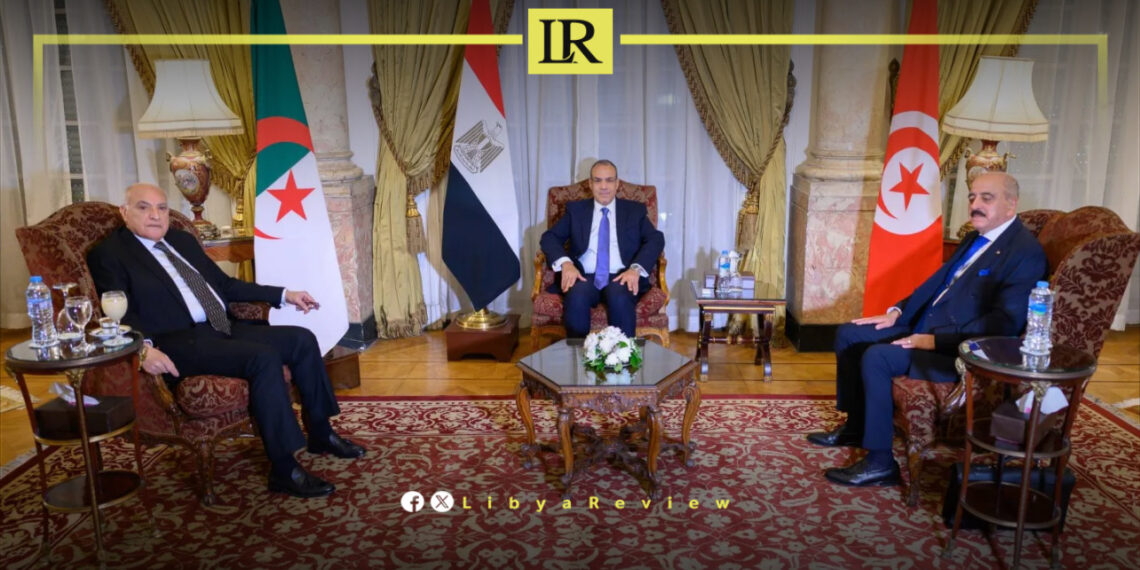Egypt, Algeria, and Tunisia have jointly called on all Libyan parties to exercise maximum restraint and immediately halt the ongoing escalation, as political tensions and divisions threaten to plunge Libya deeper into instability.
The call was made on Saturday during a meeting in Cairo of the foreign ministers of the three countries, held within the framework of the Tripartite Neighboring Countries Mechanism on Libya.
The meeting brought together Egypt’s Foreign Minister Badr Abdelatty, Algeria’s Ahmed Attaf, and Tunisia’s Mohamed Ennifi.
In a joint statement following the talks, the ministers stressed the urgent need to prioritize Libya’s national interest, preserve its wealth and institutions, and guide the country toward unity and democratic transition through dialogue rather than conflict.
They reiterated their full support for a comprehensive political solution led and owned by Libyans themselves, under the auspices of the United Nations and with strong backing from neighboring countries.
The ministers emphasized that the path forward must involve genuine consensus among all Libyan factions, without exclusion, and be aimed at restoring unified institutions and preparing for simultaneous presidential and parliamentary elections.
The three nations warned of the dangers of continued political fragmentation, highlighting the risks of further violence, terrorism, and broader regional instability. They affirmed that the security and stability of Libya is directly linked to the security of its neighboring states.
Rejecting all forms of foreign interference in Libya, the ministers made clear that external involvement has only prolonged the crisis, deepened divisions, and undermined sovereignty. They urged international actors to respect Libya’s independence and support an inclusive, Libyan-led peace process.
The joint statement also underscored the importance of continuing support for the 5+5 Joint Military Commission and the enforcement of the existing ceasefire. It called for a clear timeline to remove all foreign forces, mercenaries, and foreign fighters from Libyan territory, and to reunify Libya’s military and security institutions.
This latest diplomatic engagement signals a renewed effort by Libya’s neighbors to prevent further deterioration and support a return to national dialogue and reconciliation, amid heightened tensions and stalled political progress on the ground.
The call was made on Saturday during a meeting in Cairo of the foreign ministers of the three countries, held within the framework of the Tripartite Neighboring Countries Mechanism on Libya.
The ministers stressed the urgent need for all Libyan factions to act with maximum restraint to prevent further deterioration of the already fragile situation. They emphasized that the time has come to prioritize the interests of the Libyan people over political rivalries or external agendas, urging an end to the state of division that has paralyzed Libya’s institutions and delayed elections for years.
The statement emphasized that any resolution to the Libyan crisis must come from within, through a Libyan-owned political process rooted in national consensus and guided by the United Nations. The ministers rejected any form of foreign interference, warning that external involvement has only deepened tensions, prolonged instability, and undermined the sovereignty of the Libyan state.
The three countries reiterated their full support for holding simultaneous presidential and parliamentary elections as a key step toward restoring legitimacy and unity. They also called for an inclusive national dialogue that allows all political, social, and regional components of Libyan society to be part of shaping the country’s future.
Highlighting regional security concerns, the ministers underlined that Libya’s stability is directly tied to the security of its neighboring countries. They warned that any further escalation could open the door to renewed violence, terrorism, and the collapse of key institutions.
The statement also reaffirmed the importance of supporting the efforts of the 5+5 Joint Military Commission, particularly in upholding the ceasefire agreement and ensuring the full withdrawal of all foreign forces, fighters, and mercenaries from Libyan territory within a clear and defined timeframe. Unifying the country’s military and security structures under a single national framework was also identified as a critical step toward long-term peace.


